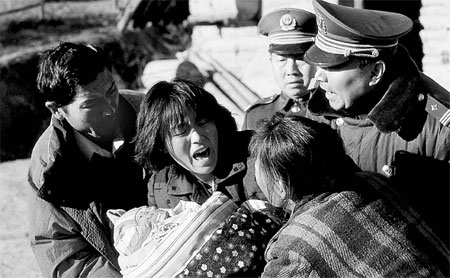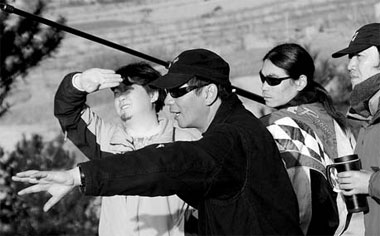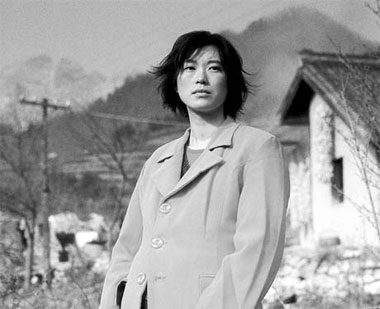Painting a bleak picture
 |
| A scene from Li Yang's new film Blind Mountain. |
So says director Li Yang about his second film, Blind Mountain (Mang Shan), which premiered on the Chinese mainland on November 23. Following his 2003 Silver-Lion-winning Blind Shaft (Mang Jing), a chilling story about coalminers, his latest offering depicts a woman's ordeal after being sold to a mountain village in the early 1990s.
The heroine Bai Xuemei, a naive university graduate, was eager to find a job to repay her family's debts. She follows a man who pretends to be a herbal medicine company manager to a small mountain village, only to find she has been sold for 7,000 yuan (US $933) to middle-aged local farmer Huang Degui as his wife. She repeatedly tries to flee, but fails again and again due to her lack of support in the community.
Li's stark film is at odds with big budget blockbusters decorated with golden costumes. Its bleak imagery - the mountain-ringed village, the ruthless and indifferent farmers - is believed by some critics that it may actually please Western audiences who respond to portraits of China's backwardness.
But Li says he doesn't regard the movie as a critique of his homeland.
 |
|
Li Yang (second from left) directs the shooting of Blind Mountain in Shaanxi Province. File Photos |
"The heroine never admits that she is the bride of the family and never gives up trying to escape," the 48-year-old said in an interview with China Daily. "It is her grace that moves me. Do you think such a noble soul is an example of China's underside?"
Li first came up with the idea for the film in 1999, after reading a report about a sold woman who killed her so-called "husband" after years of abuse. The story shocked him, and soon Li found other similar cases of human trading. But why could not they escape? What are the people around them doing? Why didn't they lend a hand?
With these questions in mind, Li traveled to Southwest China's Sichuan Province in 2006. There he talked with many people who had been sold, a human trafficker and also a man who had saved many abducted women.
That year, with a budget of 4 million yuan ($530,000) and a self-written script, Li and his crew started filming in a village in Shaanxi Province.
To be as authentic as possible, he cast only one professional actress, with the rest being local farmers and one of the sold women he interviewed. Born in Shaanxi himself, Li wrote the script using his knowledge of the local language. But during shooting, he asked the actors if they thought the dialogue was suitable. He even banned lead actress Huang Lu from using her cell phone or taking showers in order to heighten a feeling of isolation.
Despite his devotion to the project, Li's investor pulled out during production. To keep the filming afloat, Li borrowed money from his family.
 |
| Bai Xuemei, played by the film's only professional actress Huang Lu. |
"The question is worth reflecting on," he says, "how can men be so indifferent to another's suffering?"
"The local villagers, the leaders of the village and people she met when she escaped to the town - didn't they see the girl's desperation?
"In fact, the title 'Blind Mountain' refers to those with eyes who refuse to see."
Despite his condemnation of some of the villagers' actions, Li refuses to define them as either good or bad.
"Even those who do not help the heroine are not evil people. Kindness and evil coexist in human nature," he says.
"When the evil is not stopped or criticized, it grows. As in the film, no one steps forward to stop the man from buying and abusing the girl, which helps him continue the atrocity."
Instead of providing solutions, Li says he wants to show evil and have viewers draw their own conclusions.
Li agrees that the years he spent in Germany have profoundly influenced in his filmmaking. In 1987, as a student at the Beijing Broadcasting Institute (today's Communication University of China), Li got the chance to study in Germany and stayed there for 14 years. German films' tendency to reflect on humanity hugely influenced his approach.
Film is like a knife that cuts society open, forcing viewers to examine what's inside, Li says. For some, such analysis is difficult and Blind Mountain has been criticized by some as being too depressing. But the director insists that such thought-provoking films are essential to the future of cinema.
"I can do entertaining films one day," he says.
"But if all the films in our theaters were like that, it would be sad. China is big enough to accommodate films that lead viewers to think."
(China Daily 11/30/2007 page20)














